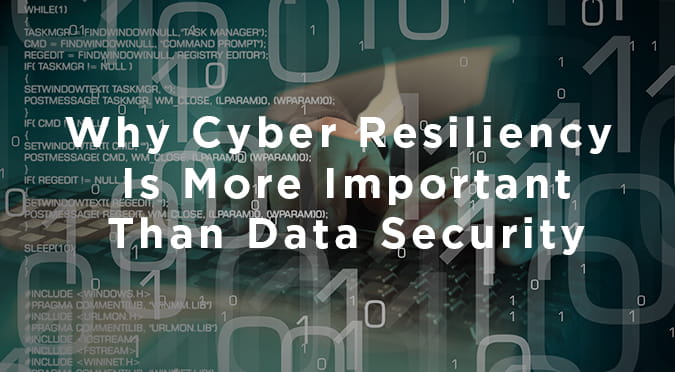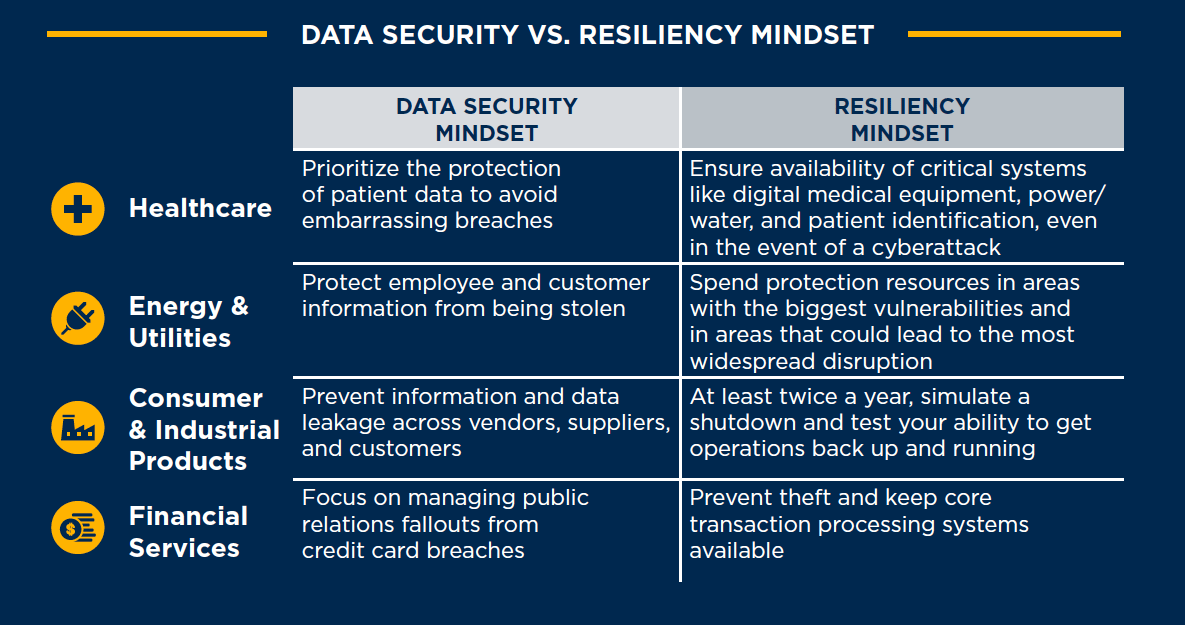
June 3, 2019 | InBrief
Why cyber resiliency is more important than data security
Why cyber resiliency is more important than data security
These days executives are highly attuned to protecting personal data if for no other reason than because it is what customers expect and compliance requires. Data breaches regularly make headlines and avoiding them has become a top concern.
Data, along with its connected systems and networked technologies, is the lifeblood of modern business. It fuels the engines of business by creating efficiencies, connections, and profits. And while the value of digitized data and systems is well understood, the dependency caused by their ubiquity reveals a hidden weakness: What happens when those systems grind to a halt?
Business operations matter more than data security
The truth is that focusing on data protection and security is not enough to protect the viability of your business operations. For that, you must consider the business case for long-term planning and increased investment in a holistic cybersecurity vision — one that’s designed to build and maintain operational resiliency — and ultimately shift from a mindset of data security to one of cyber resiliency.
Stop underprioritizing resiliency and overprioritizing data security
First and foremost, your customers rely on your company to deliver the services and products they need. Cyber threats not only implicate customer data, but more importantly, they can disrupt service delivery. Therefore, prolonged service disruptions do far more damage to customers than data breaches alone. It’s easy to see how these priorities play out. Ask yourself: Would you prefer a hospital that can treat you during a medical emergency, or one that suffers a system failure? What’s more important: breach of your personal data or days without running water, heat or power?
The best way to deal with inevitable security incidents and breaches is to make your network and your business resilient. This means taking a companywide, high-level approach to evaluating your network’s interdependencies and vulnerabilities. It means running scenarios, testing backup solutions, communicating with staff, and prioritizing budgets and engagement with the board of directors.
Focus on response and resiliency
Cyber resiliency is what will allow you to continue serving customers while minimizing the damage to your data, your reputation, and your bottom line. And yet, too many executives view cybersecurity as a discrete data security problem. Too few perceive it as an operational threat to their business. In the worst cases, it’s simply a compliance box to check. But consider that when cyber threats take down or breach critical systems, the risk to your business goes far beyond stolen data, possible fines, or momentary customer displeasure.
Misprioritizing cyber resiliency has real business consequences
When a cyberattack happens, being caught flat-footed and ill-prepared — without a resiliency mindset means:
-
Prolonging a period of operational shutdown
-
Lost revenue
-
Unforeseen legal and technical costs
-
Communication chaos
-
Most crucially, canceled services and missed expectations for customers
The first step toward adopting a resiliency mindset is understanding that the goal is not to simply protect customer data, but to ensure continued operations and service delivery to customers. It is the latter upon which customers truly depend. And prolonged service disruption — imagine homes without power, hospitals unable to treat patients, food logistics failures — can leave a permanent reputational mark, do lasting damage to your company and even jeopardize the health and security of individuals.
Learn more about how to adopt a cyber resiliency mindset and create change within your organization by downloading our latest white paper, “The Cyber Resiliency Mandate: Preventing Business Disruption in an Age of Cyberattacks”.


